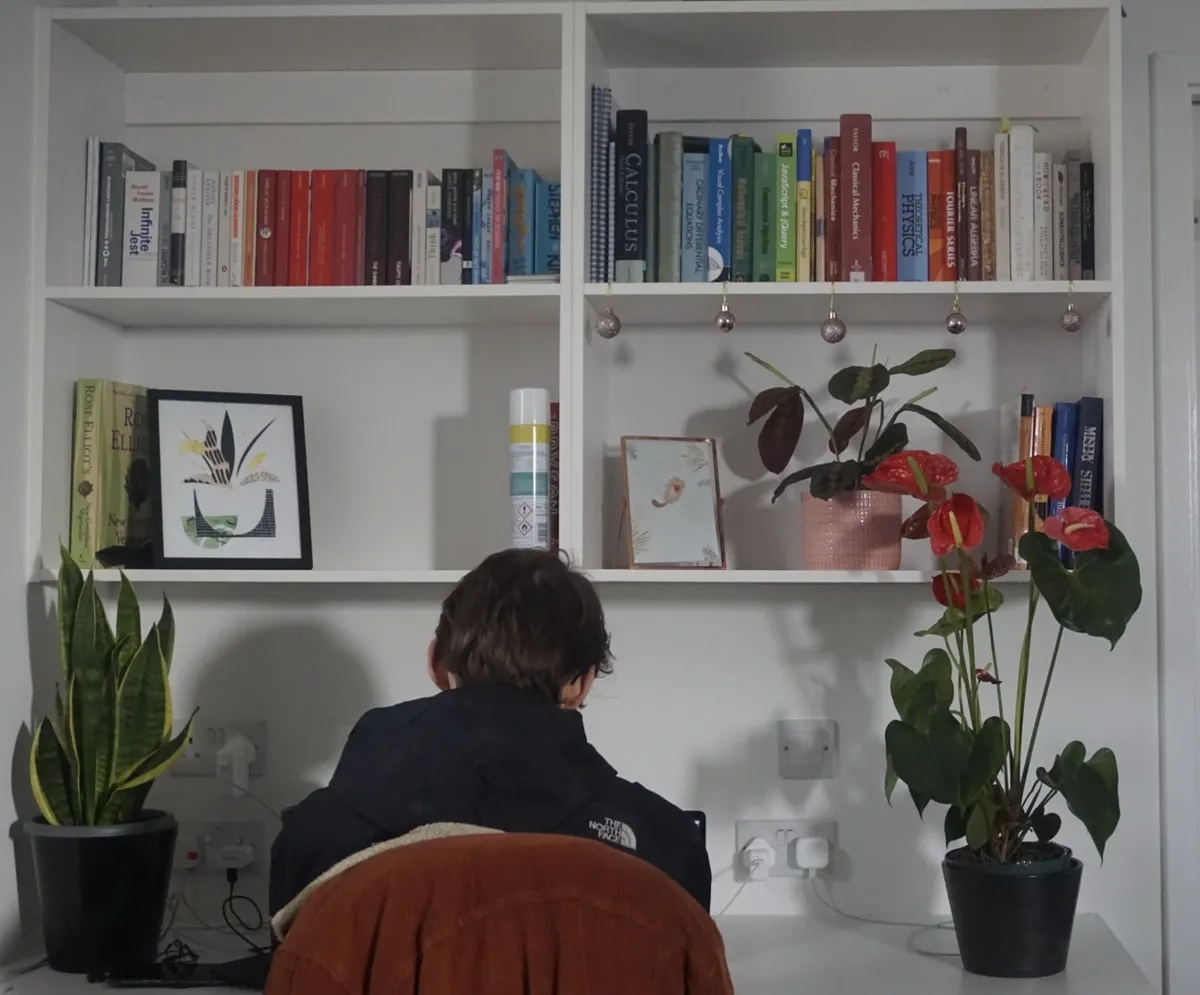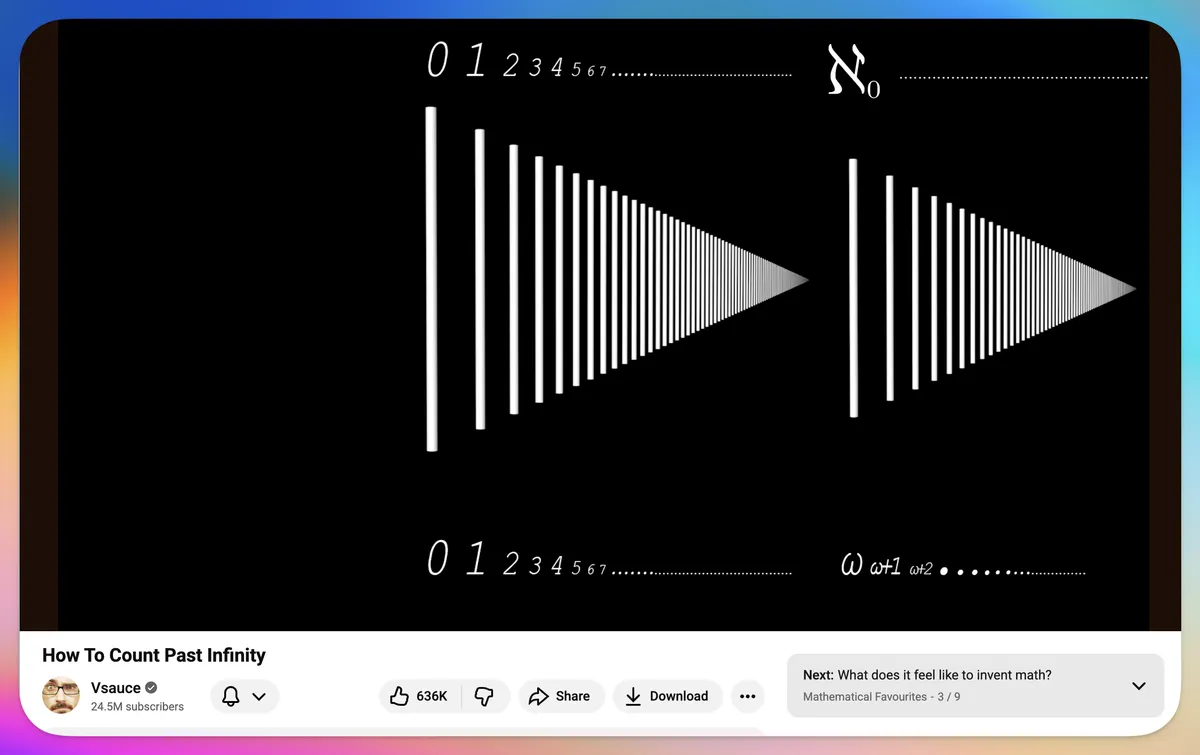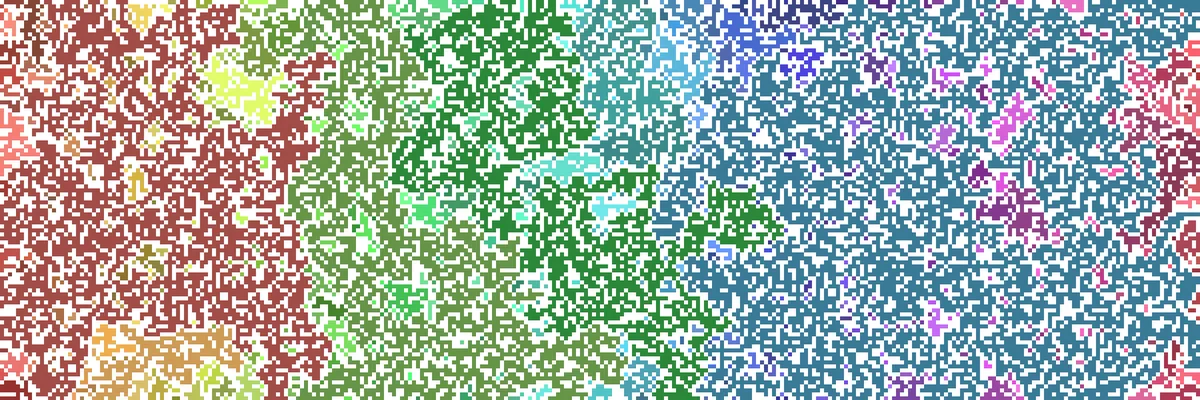How I self-taught mathematics.
Introduction
Here is my approach to self-studying maths from essentially no prior knowledge. I've deliberately avoided any YouTube videos/blog posts on this topic, as I wanted to provide an authentic account of my process.
 me studying maths at my desk during my final year
me studying maths at my desk during my final year
Conditions.
- You must really, really want to learn maths.
- If you find an area of maths which takes your interest, you must pause the roadmap in this post and follow your curiosity. You can always return later.
My background
I did mathematics at university, worked very hard and got a first.
People are often surprised to learn that I didn't study maths at all (except from a terrible GCSE I did, which got remarked to a B) until university.
After the initial surprise, they always ask me how it was possible to go from barely solving equations to being very comfortable with calculus and proofs in a year; I'd often hear “You can't teach yourself maths” or “you must be naturally smart”. Neither is true. I am dyslexic, and have ADHD. I like to think that if I could get pretty good at maths, then anyone can.
I did poorly at college (this is a two-year stage of education between high school and university in the UK), leaving with some Cs in Art History, Philosophy, and Photography. Not exactly the best foundation for a mathematics education.
Towards the end of college, I started watching Numberphile videos. Numberphile is an educational YouTube channel showing off the most beautiful parts of maths. I was totally captivated by the concepts…to me, it felt like music. It felt like a grand project which had been built bit-by-bit for thousands of years. It also had no entry fee; even someone from a modest background such as myself could learn to appreciate it!

I've tried to put any mathematically inspirational videos I remember watching into this playlist.
I took a gap year off and spent it working at Matalan (a budget clothing store) and studying maths.
After learning maths for a year, I arrived at the Mathematics open day at The University of Plymouth and convinced (read: begged) the admissions tutor to let me do some sort of test so I could directly enter. He agreed and several months later I did a test which involved proving several results (such as integration by parts) from calculus, doing some trigonometry, and calculating some integrals.
The Syllabus
Introduction
This syllabus is arranged into 3 parts. I suspect that a motivated autodidact could cover this in much less than a year.
If you find something difficult and feel like you're making no progress, that's a good thing. Learning maths is all about reaching this point, going to bed, and making slightly more progress the next day. Despite all the maths prodigies you see, the truth is that most people really struggle over and over until it clicks.
You only have to make it to the “first click”, after this you'll believe that you can make progress on previously impossible seeming material.
1. Learning to calculate (3-6 Months)
This is the hardest part because you're building up your intuition. This is like learning to walk. Running is fun. Jumping on a trampoline is fun. Learning to walk isn't fun. This is learning to walk.
Your goal in this part is to cover everything called “pre-calculus”. This is all the maths before calculus.
Learn to do a type of calculation (solving basic equations, simplifying fractions, etc).
Try it several times.
Rest and try again.
If you still can't do it, watch another video or read a different chapter on how to do it. Then try again to do it.
I basically locked-in on Khan Academy for a few months until I could do everything below Calculus. This was many years ago, but Khan Academy seems roughly the same now. After getting pretty good at Khan Academy I worked through a book called "Pre-calculus in a nutshell"…
You don't need to read it cover-to-cover, but it's good to get used to using books for learning over videos. They are still the principal method of learning advanced maths.
Resources
- Khan Academy
- Pre-algebra (feel free to skip if you're already comfortable with basics).
- Algebra 1.
- Algebra 2.
- Trigonometry.
- Pre-calculus.
- Pre-calculus in a nutshell - Simmons.
2. Calculus (3-6 Months)
Calculus will eventually seem basic to you, but when you are first learning it, you will suffer. This is because it's normally the first point that you start seeing that maths isn't just about numbers and variables, but is actually much more general. It's a system for reasoning about properties and structure.
Integration transforms a function into another function, and derivatives are as much about the properties of functions as they are about the functions themselves. This isn't just about number crunching any more (I guess it still is for definite integrals).
Calculus is the first time that you have to contend with this aspect of maths.
I suggest starting the calculus portion of Khan Academy at this point, but you should also pick up one of the more basic calculus books. Don't use the frequently recommended Spivak. Spivak is great later on for an introduction to a field of mathematics called “real analysis”, but for initially learning calculus it's a poor choice.
Resources
- Khan Academy - Calculus 1 onwards. Once you are happy with the basics of integration and derivatives, move on to some books:
- Calculus: Early Transcendentals by James Stewart.
- Schaum's Outline of Beginning Calculus - Controversial because it's high-level, but these are reliable sources for fully worked through examples of complex calculations. Use this if Stewart is still too technical after Khan Academy.
3. Building mathematical maturity (6 Months)
This stage is all about starting to learn about what maths is really about. You will start to see maths as a world of interconnected concepts rather than just a set of operations you perform on numbers.
After this stage, you are free to study whatever area of maths you want. But be warned, each area of maths has its norms and introductory material. You will have the required maturity to tackle it, though.
These resources (apart from Strang's Linear Algebra) are much more “meta” and are more about how to learn advanced mathematics rather than the actual maths itself.
Resources
- Strang's Linear Algebra, filmed in the 1990s, but still one of the best introductions to linear algebra. So great in every way.
- Any introduction to multivariate/vector calculus. I learnt this quite late, and I think often you can get away with delaying it…until you do anything physics or PDE related. Don't make the same mistake as me, cover this early once you've done a bit of linear algebra and have mastered basic calculus from Section 2.
- How to study for a Mathematics degree This book fundamentally changed how I approached mathematics. I read it by total chance, but it contains wisdom on how to approach learning mathematics in general: not just for a degree.
- Towards Higher Mathematics will fill in any details you might have missed up to this point. It includes some calculus, some induction, complex numbers, and vectors.
- How To Prove It was the final book I read before starting university. After reading most of the others, this one is what got me the most prepared for the slightly different flavour of mathematics you encounter on more advanced courses.
- Spivak's Calculus is now a good choice. Very rigorous (for this point of the journey anyway) and includes very interesting exercises.
4. Branching out to advanced topics (The rest of your life)
It's at this point you can actually start learning the exciting mathematics which you've seen on YouTube but for real. It will be harder but learning advanced maths is honestly a sublime experience.
You should basically take an area you want to study, research the best introductory books, and then…read them and do all the exercises. That's it!
There's also network effects in maths. As you learn each area, you'll be able to learn a related area quicker — learning Abstract Algebra makes it much easier to learn Number Theory.
I'd recommend getting some inspiration from some actual university syllabuses at this point to see what would be a great next step.
Recommended Next Steps
- Abstract Algebra.
- Linear Algebra.
- Linear Algebra Done Right - Axler
- A classic. Axler hates determinants, though.
- Linear Algebra Done Right - Axler
- Complex Analysis.
- Real Analysis.
- Apostol - Mathematical Analysis (Like Baby Rudin, but slightly nicer. Mostly available second-hand on AbeBooks and the like. I don't believe it is currently in print.)
- Percolation Theory.
- The study of an idealized material which can randomly fill a substrate. Despite its dry, technical name, it's actually so fascinating.
- An underrated field. So approachable and interesting. A good opportunity to do some computational maths, which isn't just game of life.
- Introduction To Percolation Theory By Stauffer
- Percolation Theory Using Python: Not read this one, but it's open access and looks intriguing.
- Fractal Geometry
- Fractal Geometry: Mathematical Foundations and Applications - Falconer.
- This will melt your brain, but it's a first principles treatment of fractal geometry. Requires a good understanding of the real numbers and set-based proofs.
- Again, it's available second-hand. It is no longer in print.
- Fractal Geometry: Mathematical Foundations and Applications - Falconer.
 An example of "clusters" in percolation theory
An example of "clusters" in percolation theory
A note on sourcing books
It might be surprising to learn that many great mathematics books are not available as high quality e-books. Sometimes, if they are available, they are terrible scans from what might as well be from a camera found in the family e-waste drawer.
You might be able to use some new, cutting-edge OCR LLMs to produce some markdown or something from the scans. I haven't tried this myself, but I'm sure the technology will be great in a year or so.
In the interim between now and fully automated maths professors, I recommend using Abebooks to source your mathematics book. If you go to Plymouth University's Maths Faculty building, you will find many of my old mathematics book (sourced from AbeBooks) on the ground floor library, which I donated after completing my degree.
Conclusion
I'm sure learning mathematics is different from when I learnt it in the 2010s. You have ChatGPT, more online courses, and Discord communities dedicated to learning maths. Maybe this makes it easier. Perhaps it's harder.
That said, I still look forward to when I have time away from my day job (as a Data Engineer) to try to work through a few pages of my current mathematics tome.
I hope you too can get far enough in this journey to reach the point where learning maths is an enjoyable, solitary hobby where you occasionally get to explore a world which is entirely different to our own.